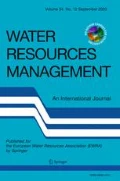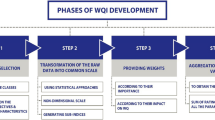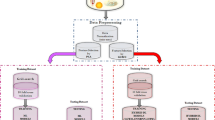Abstract
Hydropower energy generation depends on the available water resources. Therefore, planning and operation of the water resource systems are paramount tasks for energy management. Since reservoirs are one of the important components of water resources systems, extracting optimal operating policies for proper management of energy generated from these systems is an imperative step. Optimizing reservoir system operation (ORSO) is a non-linear, large-scale, and non-convex problem with a large number of constraints and decision variables. To solve ORSO problem effectively, a robust diversity-based, sine-cosine algorithm (RDB-SCA) is developed in the present study by introducing several strategies to balance the global exploration and local exploitation ability and to achieve accurate and reliable solutions. An efficient linear operation rule is coupled with the RDB-SCA to maximize the energy generation. The proposed method is then applied to a real-world, multi-reservoir system to extract optimal operational policies and, consequently, maximize the energy production. It is shown that the RDB-SCA is able to generate 24, 14, and 6% more energy than the original SCA, respectively for 2-, 3-, and 4-reservoir systems. The present findings are useful to suggest guidelines for efficient operation of hydropower multi-reservoir systems. This paper is supported by https://imanahmadianfar.com/codes.










Similar content being viewed by others
Availability of Data and Materials
All data used in the study are available from the corresponding author by request.
Code Availability
The source codes of the paper and online web service for any question and supplementary material including all equations of the algorithms will be publicly available at http://imanahmadianfar.com.
Reference
Abd Elaziz M, Oliva D, Xiong S (2017) An improved Opposition-Based Sine Cosine Algorithm for global optimization. Expert Syst Appl 90:484–500
Ahmadi Najl A, Haghighi A, Mohammadvali-Samani H (2016) Simultaneous optimization of operating rules and rule curves for multireservoir systems using a self-adaptive simulation-GA model. J Water Resour Plan Manag 142:04016041
Ahmadianfar I, Bozorg-Haddad O, Chu X (2019a) Optimizing Multiple Linear Rules for Multi-Reservoir Hydropower Systems Using an Optimization Method with an Adaptation Strategy. Water Resour Manag 33:4265–4286
Ahmadianfar I, Bozorg-Haddad O, Chu X (2020a) Gradient-based optimizer: A new metaheuristic optimization algorithm. Inf Sci 540:131–159
Ahmadianfar I, Khajeh Z, Asghari-Pari S-A, Chu X (2019b) Developing optimal policies for reservoir systems using a multi-strategy optimization algorithm. Appl Soft Comput 80:888–903
Ahmadianfar I, Kheyrandish A, Jamei M, Gharabaghi B (2020b) Optimizing operating rules for multi-reservoir hydropower generation systems: An adaptive hybrid differential evolution algorithm. Renew Energy. https://doi.org/10.1016/j.renene.2020.11.152
Ahmadianfar I, Samadi-Koucheksaraee A, Bozorg-Haddad O (2017) Extracting Optimal Policies of Hydropower Multi-Reservoir Systems Utilizing Enhanced Differential Evolution Algorithm. Water Resour Manag 31:4375–4397
Bellman R (1954) The theory of dynamic programming. RAND Corp Santa Monica CA
Bozorg-Haddad O, Afshar A, Mariño MA (2006) Honey-bees mating optimization (HBMO) algorithm: a new heuristic approach for water resources optimization. Water Resour Manag 20:661–680
Bozorg-Haddad O, Janbaz M, Loáiciga HA (2016) Application of the gravity search algorithm to multi-reservoir operation optimization. Adv Water Resour 98:173–185
Bozorg-Haddad O, Karimirad I, Seifollahi-Aghmiuni S, Loáiciga HA (2014) Development and application of the bat algorithm for optimizing the operation of reservoir systems. J Water Resour Plan Manag 141:04014097
Bozorg Haddad O, Afshar A (2004) MBO (Marriage Bees Optimization), a new heuristic approach in hydrosystems design and operation. Proceedings of the 1st International Conference on Managing Rivers in the 21st Century: Issues and Challenges Penang, Malaysia 21–23
Brest J, Greiner S, Boskovic B, Mernik M, Zumer V (2006) Self-adapting control parameters in differential evolution: A comparative study on numerical benchmark problems. IEEE Trans Evol Comput 10:646–657
Chen L, McPhee J, Yeh WW-G (2007) A diversified multiobjective GA for optimizing reservoir rule curves. Adv Water Resour 30:1082–1093
Dahunsi SO, Oranusi S, Efeovbokhan VE (2017) Optimization of pretreatment, process performance, mass and energy balance in the anaerobic digestion of Arachis hypogaea (Peanut) hull. Energy Convers Manag 139:260–275
Feng M, Liu P, Guo S, Shi L, Deng C, Ming B (2017) Deriving adaptive operating rules of hydropower reservoirs using time-varying parameters generated by the E n KF. Water Resour Res 53:6885–6907
Friedman M (1937) The use of ranks to avoid the assumption of normality implicit in the analysis of variance. J Am Stat Assoc 32:675–701
Ghasemi M, Aghaei J, Akbari E, Ghavidel S, Li L (2016) A differential evolution particle swarm optimizer for various types of multi-area economic dispatch problems. Energy 107:182–195. https://doi.org/10.1016/j.energy.2016.04.002
Guo X, Hu T, Zeng X, Li X (2012) Extension of parametric rule with the hedging rule for managing multireservoir system during droughts. J Water Resour Plan Manag 139:139–148
He S, Yin XA, Yu C, Xu Z, Yang Z (2018) Quantifying parameter uncertainty in reservoir operation associated with environmental flow management. J Clean Prod 176:1271–1282
Heidari AA, Mirjalili S, Faris H, Aljarah I, Mafarja M, Chen H (2019) Harris hawks optimization: Algorithm and applications. Future Gener Comput Syst 97:849–872
Holland JH (1992) Genetic algorithms. Sci Am 267:66–73
Hossain MS, El-Shafie A (2014) Performance analysis of artificial bee colony (ABC) algorithm in optimizing release policy of Aswan High Dam. Neural Comput Appl 24:1199–1206
Ibrahim RA, Elaziz MA, Lu S (2018) Chaotic opposition-based grey-wolf optimization algorithm based on differential evolution and disruption operator for global optimization. Expert Syst Appl 108:1–27
Jabr RA, Coonick AH, Cory BJ (2000) A homogeneous linear programming algorithm for the security constrained economic dispatch problem. IEEE Trans Power Syst 15:930–936
Jiang Z, Ji C, Qin H, Feng Z (2018) Multi-stage progressive optimality algorithm and its application in energy storage operation chart optimization of cascade reservoirs. Energy 148:309–323
Jothiprakash V, Shanthi G (2006) Single reservoir operating policies using genetic algorithm. Water Resour Manag 20:917–929
Karaboga D, Basturk B (2007) A powerful and efficient algorithm for numerical function optimization: artificial bee colony (ABC) algorithm. J Glob Optim 39:459–471
Karamouz M, Houck MH, Delleur JW (1992) Optimization and simulation of multiple reservoir systems. J Water Resour Plan Manag 118:71–81
Kirkpatrick S, Gelatt CD, Vecchi MP (1983) Optimization by simulated annealing. Science 220:671–680
Louati MH, Benabdallah S, Lebdi F, Milutin D (2011) Application of a genetic algorithm for the optimization of a complex reservoir system in Tunisia. Water Resour Manag 25:2387–2404
Madani K (2010) Game theory and water resources. J Hydrol 381:225–238
Madani K, Lund JR (2010) Estimated impacts of climate warming on California’s high-elevation hydropower. Clim Change 102:521–538
Mirjalili S (2016) SCA: a sine cosine algorithm for solving optimization problems. Knowl Based Syst 96:120–133
Mohamed AW (2015) An improved differential evolution algorithm with triangular mutation for global numerical optimization. Comput Ind Eng 85:359–375
Qin AK, Huang VL, Suganthan PN (2009) Differential evolution algorithm with strategy adaptation for global numerical optimization. IEEE Trans Evol Comput 13:398–417
Ridha HM, Heidari AA, Wang M, Chen H (2020) Boosted mutation-based Harris hawks optimizer for parameters identification of single-diode solar cell models. Energy Convers Manag 209:112660
Simpson AR, Dandy GC, Murphy LJ (1994) Genetic algorithms compared to other techniques for pipe optimization. J Water Resour Plan Manag 120:423–443
Soltani F, Kerachian R, Shirangi E (2010) Developing operating rules for reservoirs considering the water quality issues: Application of ANFIS-based surrogate models. Expert Syst Appl 37:6639–6645
Storn R, Price K (1997) Differential evolution–a simple and efficient heuristic for global optimization over continuous spaces. J Glob Optim 11:341–359
Takriti S, Krasenbrink B (1999) A decomposition approach for the fuel-constrained economic power-dispatch problem. Eur J Oper Res 112:460–466
Tang W, Li Z, Qiang M, Wang S, Lu Y (2013) Risk management of hydropower development in China. Energy 60:316–324
Tospornsampan J, Kita I, Ishii M, Kitamura Y (2005) Optimization of a multiple reservoir system using a simulated annealing–A case study in the Mae Klong system, Thailand. Paddy Water Environ 3:137–147
Wardlaw R, Sharif M (1999) Evaluation of genetic algorithms for optimal reservoir system operation. J Water Resour Plan Manag 125:25–33
Xie M, Zhou J, Li C, Zhu S (2015) Long-term generation scheduling of Xiluodu and Xiangjiaba cascade hydro plants considering monthly streamflow forecasting error. Energy Convers Manag 105:368–376
Zhang R, Zhou J, Ouyang S, Wang X, Zhang H (2013) Optimal operation of multi-reservoir system by multi-elite guide particle swarm optimization. Int J Electr Power Energy Syst 48:58–68
Zhou Q, Zhang W, Cash S, Olatunbosun O, Xu H, Lu G (2017) Intelligent sizing of a series hybrid electric power-train system based on Chaos-enhanced accelerated particle swarm optimization. Appl Energy 189:588–601
Zou D, Li S, Wang G-G, Li Z, Ouyang H (2016) An improved differential evolution algorithm for the economic load dispatch problems with or without valve-point effects. Appl Energy 181:375–390. https://doi.org/10.1016/j.apenergy.2016.08.067
Funding
There is no funding for this paper.
Author information
Authors and Affiliations
Contributions
Iman Ahmadianfar: Conceptualization, Methodology, Software, Validation, Formal analysis, Writing-Original Draft, Writing-Review & Editing, Saeed Noshadian: Methodology, Software, Validation, Formal analysis, Writing-Original Draft, Nadir Ahmed Elagib: Writing-Review & Editing, Formal analysis, Supervision, Visualization, Investigation, Meysam Salarijazi: Writing-Review & Editing, Formal analysis, Visualization, Investigation.
Corresponding author
Ethics declarations
Ethical Approval
Relevant research content in this study was in accordance with the ethical standards of the institutional and national research committee.
Consent to Participate
All of the authors consent to participate in the relevant research content in this paper.
Consent to Publish
All of the authors consent to publish the paper, and it has not been published previously nor is it being considered by any other peer-reviewed journal.
Competing Interests
The authors declare that they have no competing interests.
Conflict of Interest
None.
Additional information
Publisher's Note
Springer Nature remains neutral with regard to jurisdictional claims in published maps and institutional affiliations.
Rights and permissions
About this article
Cite this article
Ahmadianfar, I., Noshadian, S., Elagib, N.A. et al. Robust Diversity-based Sine-Cosine Algorithm for Optimizing Hydropower Multi-reservoir Systems. Water Resour Manage 35, 3513–3538 (2021). https://doi.org/10.1007/s11269-021-02903-6
Received:
Accepted:
Published:
Issue Date:
DOI: https://doi.org/10.1007/s11269-021-02903-6




